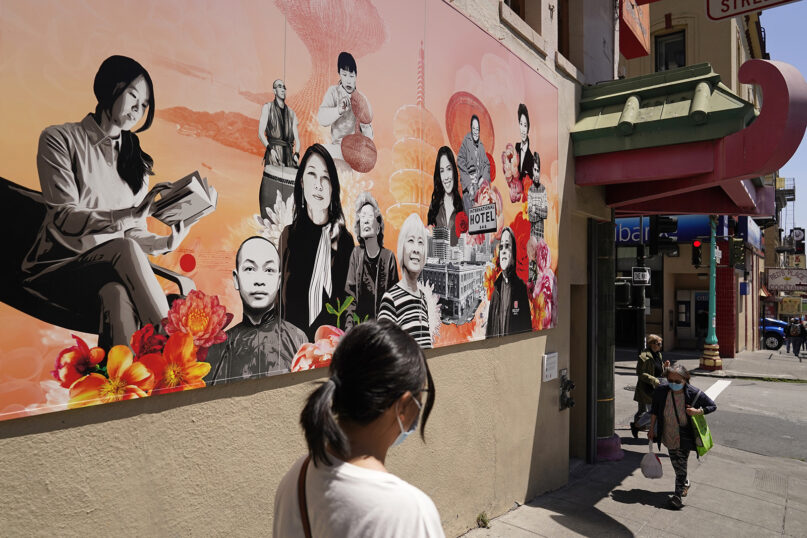LONG GROVE, Illinois (RNS) — After members of the congregation read Scripture aloud and after a discussion about a work of art depicting the body of Christ, the Rev. Juliet Liu approached one of the microphones among the chairs arranged in a circle around the Communion table.
This was just days after a shooting at a salon in Dallas’ Koreatown injured three women of Asian descent and about a year since eight people were killed at three Atlanta-area spas, including six women of Asian descent. It was also more than two years into a pandemic that brought with it a dramatic and disproportionate surge in violence against Asian Americans documented by the FBI and groups like Stop AAPI Hate.
For Liu, it was “meaningful” to be able to lament that violence during the Sunday morning service (May 15) at Life on the Vine, a church in the northwestern suburbs of Chicago she co-leads with the Rev. Susanne Calhoun.
“That’s not separate, for me, from worship,” said Liu, who is Chinese and Vietnamese American.
As racism and violence against Asian Americans began to spike during the COVID-19 pandemic, groups like the Stop AAPI Hate coalition, Leading Asian Americans to Unite for Change and the Chicago-based Asian American Christian Collaborative formed to fight back with information and advocacy. The Asian American Christian Collaborative organized events and marches like the Rally for AAPI Lives and Dignity, joined by an estimated 5,000 people in cities across the U.S.
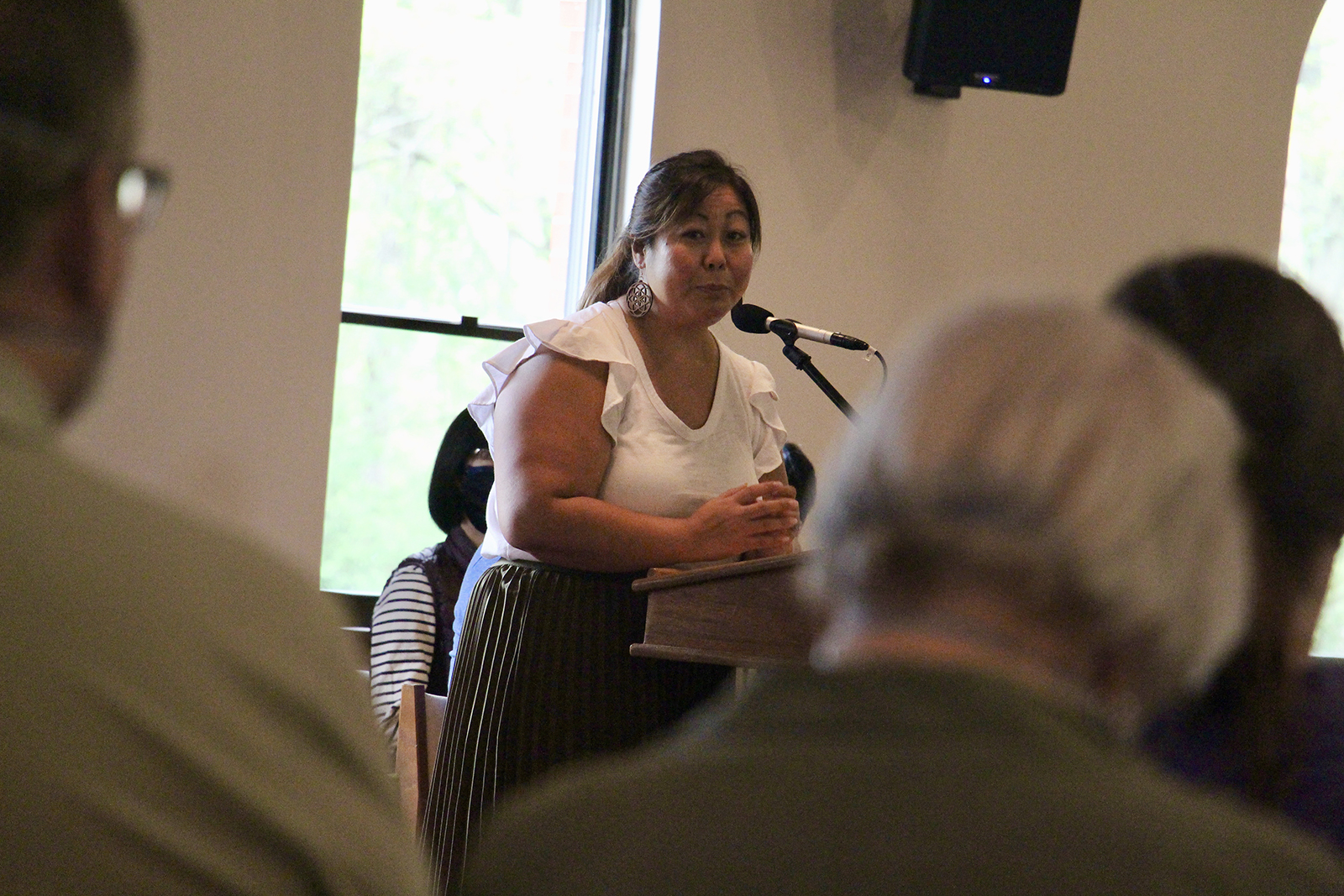
The Rev. Juliet Liu speaks to the congregation at Life on the Vine Church in Long Grove, Illinois, on May 15, 2022. RNS photo by Emily McFarlan Miller
Still, some Asian American Christian leaders believe there is more the church can be doing to address racism and violence against Asian Americans.
“In some ways, I think we have more to grieve now than we did one year ago after the March 16 Atlanta massacre,” said the Rev. Michelle Ami Reyes, an Indian American church planter in Austin, Texas, and vice president of the Asian American Christian Collaborative.
“I think what a lot of Asian Americans are struggling with is that anti-Asian violence just continues to grow.”
RELATED: At nationwide rallies, Christians stand up for Asian Americans
Few white Americans are aware that anti-Asian violence is a problem, according to Reyes, who co-authored the new book “The Race-Wise Family: Ten Postures to Becoming Households of Healing and Hope” with Helen Lee. She pointed to a 2021 study by LAAUNCH that found 37% of white Americans were unaware of the increase in attacks against Asian Americans over the previous year. The study also found 24% of white Americans didn’t believe anti-Asian racism was a problem that should be addressed.
Anti-Asian racism won’t change until those perceptions do, Reyes said.
When it launched in 2020, the Asian American Christian Collaborative released a statement with five action steps Christians could take to help end racism and violence against Asian Americans, including speaking against anti-Asian racism from the pulpit on Sunday mornings. That’s a good place to start, Reyes said, and she’s seeing more pastors feeling encouraged to do so.
There’s still a long way to go, she said.
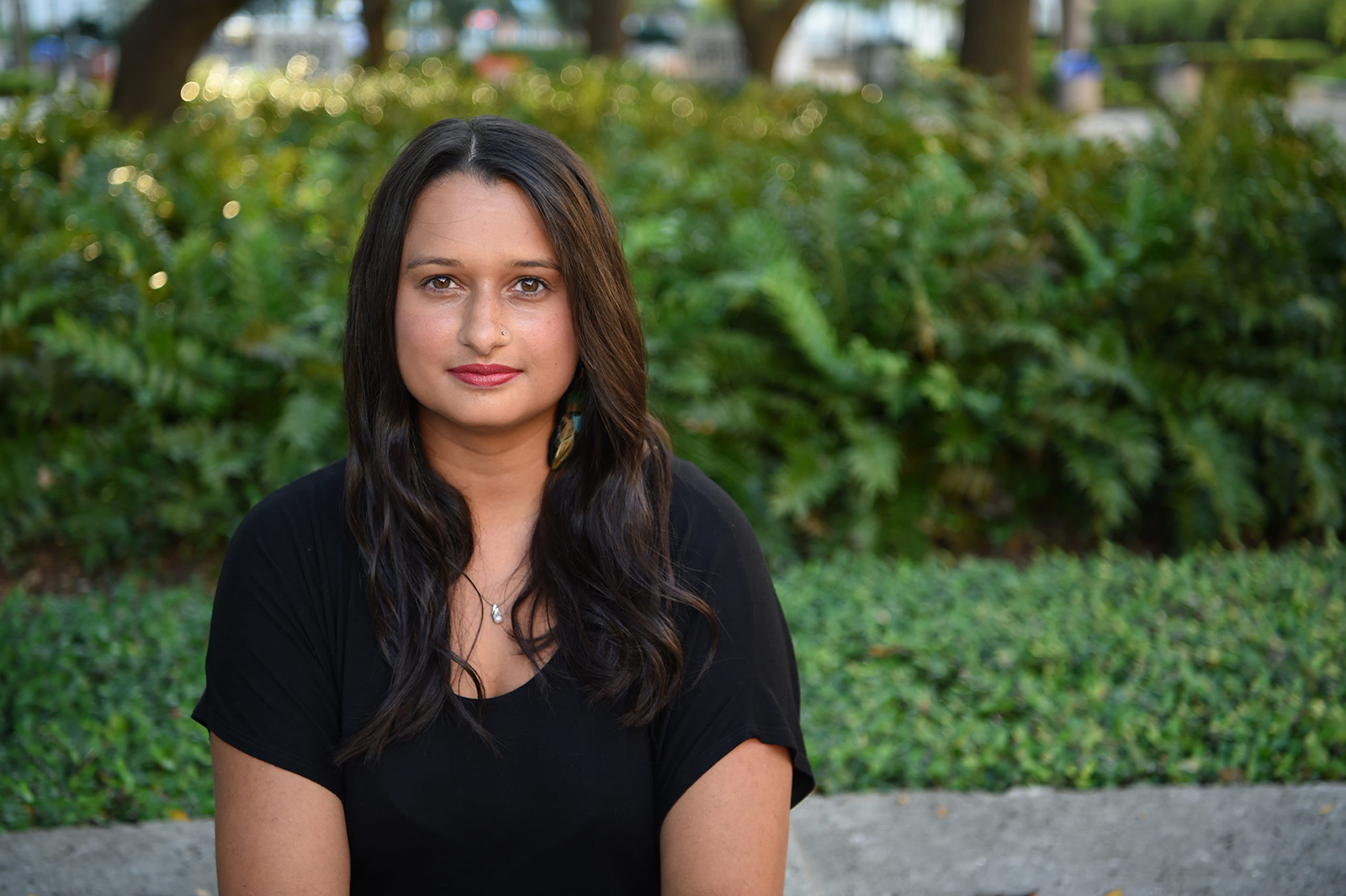
The Rev. Michelle Ami Reyes. Courtesy photo
“Race-conscious discipleship” needs to continue throughout the week, she said. And May’s Asian American and Pacific Islander Heritage Month observations need to go beyond celebrations and enjoying AAPI cuisines.
“We are plagued by these stereotypes of the model minority and perpetual foreigner,” she said.
On top of that, Reyes said, Asian American women are seen as “easy targets.”
“I think there’s something within the psyche of our U.S. American society that if Asian women are targeted, there’s not going to be much pushback. There’s not going to be severe consequences from that. And I think part of that is wrapped up into these stereotypes of Asian women as meek, as passive, as unassertive and also both physically and socially powerless,” she said.
Stop AAPI Hate recorded nearly 11,000 hate incidents against Asian Americans between March 2020 and December 2021. Of those, about 62% targeted women of Asian descent, including the shootings in Atlanta and the recent shooting at Hair World Salon in Dallas, which police say may be connected to two previous drive-by shootings at businesses run by Asian Americans.
For many Asian American women in ministry, the challenges are compounded, speakers shared at an Asian American Christian Collaborative panel discussion called “Seeking Understanding: The Lived Experiences of Asian American Female Pastors” held late last year at Apostolic Faith Church in Chicago.
They’re experiencing the uptick in anti-Asian racism and the trauma of shootings targeting Asian women, said Yulee Lee, senior director of staff culture and diversity, equity, inclusion at the Fuller Youth Institute. And, like so many clergy, they’re feeling the exhaustion of leading their congregations through the COVID-19 pandemic, oftentimes navigating largely white, evangelical and mainline spaces.
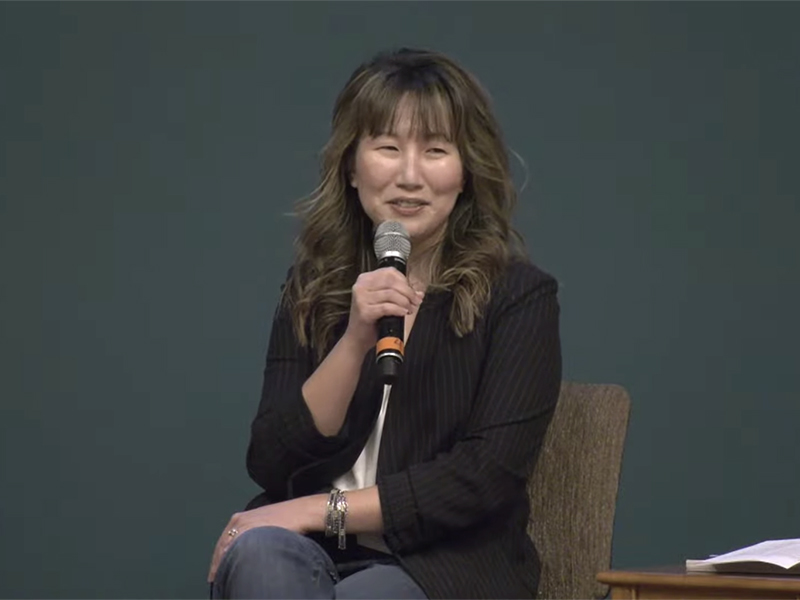
Yulee Lee speaks at the Asian American Christian Collaborative event “Seeking Understanding: The Lived Experiences of Asian American Female Pastors” on Dec. 3. 2021, at Apostolic Faith Church in Chicago. Video screen grab
All that comes on top of the implicit and explicit messaging many have received denying their calls to ministry.
“Asian American female pastors have encountered a lot of challenges in the church context, and we carry an emotional toll and trauma as a result. And so this is the backdrop. This is the norm for us,” said Lee, who said she emigrated with her family from South Korea to Idaho when she was 3 years old.
Liu, the co-pastor at Life on the Vine, shared during the event the challenges she has faced in ministry, and her experiences were echoed by a number of her fellow panelists
She grew up in a Chinese church, she said, where women did just about everything but preach: collecting and counting the offering each week, making sure announcements were made during services, teaching children and youth.
While she believed God was calling her to pastor, she couldn’t picture it, she said. Maybe she could be a pastor’s wife. Maybe she could lead worship or a small group at a church, or a parachurch ministry.
Then she came to Life on the Vine, where she began pastoring in 2014.
“It was really at Life on the Vine that I first saw women preach regularly. I witnessed how their sermons, their lives, their ministry, their personalities, not only helped the women in our congregation, but really drew the men and the women together into the kingdom,” she said.
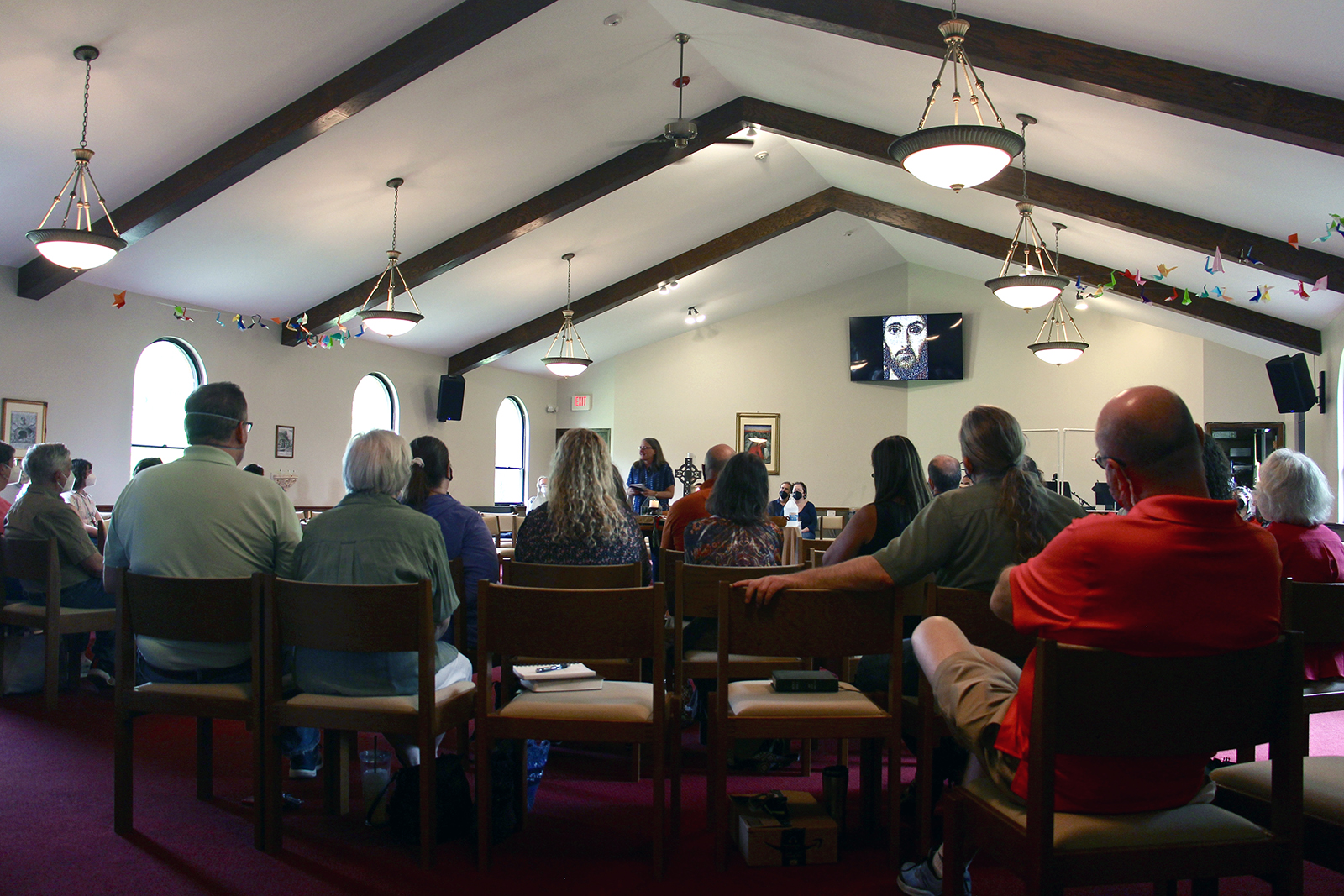
The congregation at Life on the Vine Church in Long Grove, Illinois, on May 15, 2022. RNS photo by Emily McFarlan Miller
Being an Asian American female pastor doesn’t just come with challenges, Liu said, it also comes with “blessings” — the perspective and skills she brings to her role, how she invites others to participate in worship, the way she sees justice at the heart of the gospel message.
But, she told Religion News Service, “with the sharp increase in hostility towards Asians, trying to teach my congregation about that while at the same time being one of those people was more taxing on me than I anticipated that it would be.”
At the service earlier this month, Liu lamented the shooting in Dallas, as well as the shooting at a supermarket in a predominantly Black community in Buffalo, New York, that left 10 dead and three injured in what has been called one of the deadliest racist massacres in recent American history. By the end of the day, a gunman had opened fire in a Taiwanese church in Laguna Woods, California, killing one and wounding five, in a shooting police said was motivated by political tensions between China and Taiwan.
She’s still trying to make sense of the racism she’s experienced in the last few years, and she gets discouraged. As far as her congregation has come, she said, that movement still has been slow.
But reconciliation — with God and with each other — is at the heart of the gospel, she said. She sees it as part of her call to ministry in this moment.
“Our calling as Christians is to live out that ministry of reconciliation that God makes possible,” Liu said.
RELATED: Let the church declare: Asian Lives Matter (COMMENTARY)
